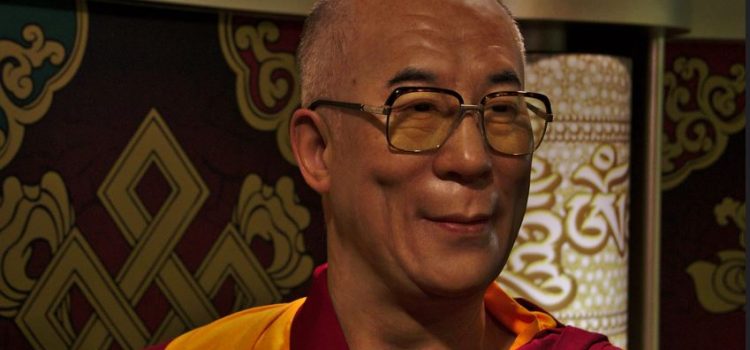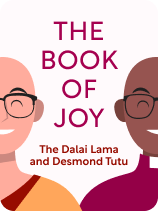

This article is an excerpt from the Shortform book guide to "The Book of Joy" by The Dalai Lama, Desmond Tutu, and Douglas Abrams. Shortform has the world's best summaries and analyses of books you should be reading.
Like this article? Sign up for a free trial here.
What are the Eight Pillars of Joy? How will these pillars help you experience joy on a daily basis?
The Book of Joy by Desmond Tutu and the Dalai Lama helps you find joy in the small things to improve your life. To emphasize just how crucial joy is, they outline the Eight Pillars of Joy that will impact your mood.
Continue reading to learn the Eight Pillars of Joy in detail.
The Core Values That Lead to Joy
Desmond Tutu and the Dalai Lama explain that to experience true joy, you must first understand that your joy doesn’t depend on your external circumstances. People often think that they’ll feel joy when their circumstances change—when they find a partner, have the perfect job, or finally own a house. This is the modern myth of happiness—the more you own or the more you accomplish, the happier you’ll be. In fact, the opposite is true. Focusing on external sources of happiness doesn’t lead to a more joyful life, but to great disconnection from other people and an increased attachment to things beyond your control.
(Shortform note: While Tutu and the Dalai Lama emphasize that joy isn’t dependent on external circumstances, some research shows that your circumstances do impact your happiness, but to a lesser degree than most people think. A 2005 study found that 10% of your happiness is determined by life circumstances, 40% by “intentional activity,” and as much as 50% by genetics. Researchers from this study have since revised their original conclusions, acknowledging these percentages oversimplify the issue because people’s circumstances, choices, and biology aren’t isolated factors, but variables that interact and influence each other on a daily basis and over the course of a lifetime.)
Tutu and the Dalai Lama outline eight core values (called the “Eight Pillars of Joy”) that offer a pathway to a more joyful life. Practicing these eight values (perspective, humility, humor, acceptance, forgiveness, gratitude, compassion, and generosity) will help you detach your happiness from your circumstances. Douglas Abrams explains these qualities as if they are each rungs on a ladder; the practice of each quality is a natural step to the next.
| The Eightfold Path: A Different Path to Joy The eight core values that Tutu and the Dalai Lama introduce are a secular path to a more joyful life; however, they’re informed by both men’s spiritual traditions. For example, the Eightfold Path, a central Buddhist principle, is a similar path to ending suffering. According to Buddhist teaching, by following the principle of the Eightfold Path, you can gradually end suffering and attain lasting peace and happiness through enlightenment. The Eightfold Path consists of the following principles: Right understanding: understanding the Four Noble Truths and the nature of reality Right thought: cultivating sincere and compassionate intentions Right speech: speaking truthfully and kindlyRight action: acting ethically and responsibly in your relationships with other people Right livelihood: earning a living that doesn’t cause harm to yourself or anybody else Right effort: cultivating wholesome states of mind and overcoming negative emotions and thoughts Right mindfulness: developing awareness of the present moment and your own mental and physical state Right concentration: cultivating the ability to focus and develop a deep meditation practice While the Eightfold Path doesn’t directly correspond to the eight core values that Tutu and the Dalai Lama outline, both paths emphasize the inevitability of suffering and the importance of occupying yourself with the well-being of others in your pursuit of lasting happiness. |
1. Perspective
The first core value is perspective. Tutu and the Dalai Lama acknowledge that it’s natural to see the world most easily from our own perspective. However, if we only consider our own interests and experiences, while ignoring everybody else’s, joy will remain out of reach.
Instead, Tutu and the Dalai Lama advocate for the cultivation of a well-rounded perspective, meaning a wider and more holistic view in which we’re able to look at the world through multiple lenses, not just our own. They add that a well-rounded perspective emphasizes commonality rather than difference, encouraging people to ask not “how am I different?” but “what do we share?” A well-rounded perspective requires the understanding that the world is bigger and more nuanced than you can know through your own experiences, but even so, we all still share the common experience of being human.
A well-rounded perspective is a foundational value in the practice of joy because changing how we see the world changes how we experience it. For example, say you’re stuck in a self-centered perspective. When someone bumps into you on the sidewalk, you’ll only see them as thoughtless and rude, which will leave you feeling angry or resentful. But, if you practice a well-rounded perspective, you can imagine that the stranger was rushing to help a friend or was simply distracted. Suddenly, you’ll feel compassion, instead of anger, and your experience of the interaction will change.
2. Humility
According to Abrams, Tutu and the Dalai Lama believe that having a well-rounded perspective on your place in the vastness of the world naturally leads to humility. Humility is the understanding that we’re all flawed, and therefore no one is better or more important than anyone else.
Humility allows you to understand your limited capacity to control the world or address the totality of its problems. Knowing you can’t address these challenges alone will naturally lead you to work more with others and, in doing so, you’ll gain a greater appreciation for our interdependence.
Unlike humility, arrogance, or the belief that we’re better or more special than others, leads to loneliness. If you can’t acknowledge your flaws, or your capacity for both productive and destructive behavior, then you won’t be able to form authentic connections with other people. This lack of vulnerability and self-awareness will keep people at a distance. Moreover, if you don’t understand the important role other people play in your life, you can’t appreciate humanity’s interdependence.
Tutu and the Dalai Lama clarify that just because you’re not special doesn’t mean that you aren’t important. Every person has gifts to bring to the world. When you’re humble, you can celebrate and share your gifts, while also honoring the gifts that other people bring.
3. Humor
When you’re humble, you rarely take yourself too seriously, and it becomes easier to see the humor in a situation or to laugh at yourself. Life is often ridiculous and unexpected. Laughing at it is a recognition of that shared reality.
Abrams explains that, according to Tutu and the Dalai Lama, humor has the power to improve our emotional and physical well-being. Like humility, it’s a tool of connection. To joke or play with someone requires that you trust them, so good-natured humor is an invitation for vulnerability and emotional connection. Laughter can also act as a balm for suffering: Studies have also shown that laughter helps alleviate anxiety and stress.
4. Acceptance
The unpredictability of life can also be challenging. Like laughter, acceptance is a coping strategy when you’re faced with these challenges. Acceptance is the ability to let go of the desire to change what you can’t control.
According to Tutu and the Dalai Lama, much of our own stress comes from wishing things were different or feeling anger and frustration when things don’t go our way. However, Tutu and the Dalai Lama explain that you must first accept reality if you have any hope of changing it. Instead of allowing suffering to cause you greater suffering, you can look for opportunities to learn from it or find greater meaning in it. For example, if you feel frustrated in your relationship with a family member, you can be angry that the relationship is hard. Or, you can accept that the relationship is challenging, and then move past your anger to ask, “How can I improve this relationship?”
5. Forgiveness
Sometimes, the things that are hardest to accept are the actions of other people. When you accept reality, you’re more likely to practice forgiveness—the deliberate choice to let go of feelings of anger or vengeance toward a person or people who have harmed you.
Forgiveness is a powerful practice because it breaks cycles of suffering. If you’re harmed and you choose anger or vengeance, then you’ve chosen to respond to harm by causing more harm; but if you choose forgiveness, you can prevent further harm from happening. For example, if someone says something cruel to you and you say something cruel in reply, then you both continue to suffer. But if you forgive them and offer compassion, you have the opportunity to transform the interaction and interrupt the ongoing suffering.
Yet Tutu and the Dalai Lama emphasize that forgiveness is not the same as condoning harmful actions. Just because you choose not to exact revenge for harm done to you doesn’t mean you approve of the person’s actions. The Dalai Lama explains that forgiveness requires that you distinguish between the person and their action. You can condemn someone’s actions without condemning the person, maintaining compassion for the person who took the action.
6. Gratitude
According to the Dalai Lama, gratitude is accepting and appreciating what exists without focusing on what you wish were different. For example, if your car breaks down, you can suffer in your frustration (even knowing it wouldn’t change anything), or you can shift your perspective and feel grateful for the existence of public transportation, the ability to walk, or that you have a car at all.
When you do feel angry, bitter, or resentful, gratitude can be a powerful remedy. When you focus on what you don’t have, you suffer—but when you express gratitude for what you have, you feel joy. So while it may seem that you’re grateful when you’re happy, in actuality, you become happier the more grateful you are.
The benefits of gratitude also extend to others. When you see the world as lacking, or deficient, you’re more likely to act out of a sense of scarcity. This fear will lead you to act only in your own self-interest. However, when you’re grateful, you see the world as full of abundance, and therefore you’re more willing to act generously toward other people. Studies have shown that those who regularly express gratitude are more empathetic, helpful, and generous toward people in their social networks.
7. Compassion
In this way, gratitude leads to compassion, the desire to alleviate another person’s suffering. When you’re grateful for what you have, your natural inclination is to turn your attention and concern to other people.
Science suggests that we’re hardwired for compassion. While many argue that people are innately selfish and competitive, cooperation has been more fundamental to humanity’s survival. As Tutu and the Dalai Lama reiterate, people are interdependent. We depend on others for survival and happiness; therefore, being invested in other people’s well-being is in our own self-interest.
Even small acts of compassion, like smiling as you pass someone, are powerful because compassion is contagious. Studies have shown that witnessing acts of compassion inspires others to act more compassionately. Treating your loved ones with compassion will cause them to act more compassionately to the people they know, who’ll then also act more compassionately within their network, causing a powerful ripple effect beyond your own immediate circle.
8. Generosity
According to Tutu and the Dalai Lama, generosity is compassion in action—the moment when you choose to act on your feelings of compassion to alleviate the suffering of others.
Generosity, acting in service to others, is foundational to our own joy and well-being. Neuroscience research shows that the reward center in our brains lights up when we help people, and our brain releases endorphins and oxytocin, making us happier and healthier. Research has shown that just thinking about generosity can strengthen people’s immune systems.
According to Buddhist teaching, there are three types of generosity: material giving (for example, money), freedom from fear (for example, compassion), and spiritual giving (for example, moral teaching). The Dalai Lama also emphasizes that giving your time can be a profound gift of generosity, whether this is volunteering or being fully present when you play with children.
Abrams adds that finding your purpose is also an act of generosity. Your purpose, he argues, is the way you choose to contribute to the world, so acting generously can begin with using your strengths to improve the well-being of others.

———End of Preview———
Like what you just read? Read the rest of the world's best book summary and analysis of The Dalai Lama, Desmond Tutu, and Douglas Abrams's "The Book of Joy" at Shortform.
Here's what you'll find in our full The Book of Joy summary:
- Archbishop Desmond Tutu and His Holiness the Dalai Lama's guide to joy
- What joy actually is and why it matters so much
- How to find joy exactly where you are, no matter what your life looks like






